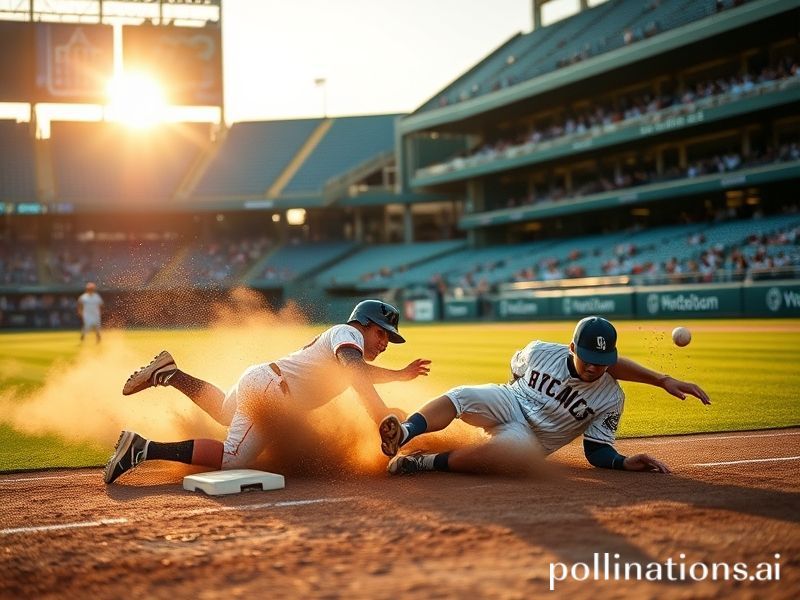Global Gladiators: How Diamondbacks vs Padres Explains Everything Wrong (and Right) with the Modern World
Diamondbacks vs. Padres: Two Small-Market Gladiators in America’s Colosseum, Watched by a World That’s Already Late for Work
By Our Man in the Cheap Seats, Somewhere Between Tijuana and Tucson
On the surface, it’s just another Wednesday-night tilt in Major League Baseball’s sprawling, 162-game telenovela: the Arizona Diamondbacks, a franchise whose payroll is roughly the GDP of Tuvalu, against the San Diego Padres, a club that spent last winter throwing around dollars like a hedge-fund toddler with a sugar high. Yet from the vantage point of the international press box—an increasingly smoky perch these days—the game radiates geopolitical overtones thicker than the smog drifting in from nearby maquiladoras.
Consider the ticket prices. A seat behind home plate costs more than the annual salary of a Bangladeshi garment worker, which means the average citizen of our interconnected planet can experience this contest only through the pixelated mercy of a dodgy streaming site hosted in Moldova. Global capitalism, ever the efficient middleman, has ensured that the diamond’s sparkle reaches every smartphone, even if the data packet travels via undersea cables rumored to be tapped by at least three intelligence agencies. One imagines a bleary analyst in Langley logging each foul ball as a potential coded message—because, frankly, stranger things have shown up in the news lately.
The players themselves are a walking United Nations. The Padres’ rotation features a Dominican flamethrower who once fixed motorcycles for gas money, a Japanese slider savant who speaks fluent San Diego surfer, and a Mexican-American slugger whose home-run trot is studied in sociology departments from Oaxaca to Osaka. Across the field, the Diamondbacks counter with an Australian reliever who throws 99 mph upside-down and a Venezuelan catcher whose family’s WhatsApp group doubles as a crisis-communications center. Somewhere in the stands, a European tourist live-tweets the whole multicultural ballet to followers who think “shortstop” is a type of espresso.
But let’s zoom out. Why, in a week when the Arctic registered its first 80-degree day and global supply chains are held together by duct tape and prayers, does a regional baseball game matter? Because sport remains the last universally translatable language, the Esperanto of distraction. While COP delegates argue over carbon credits and central bankers debate negative interest rates, the planet’s collective id still needs somewhere to put its tribal loyalties. The Diamondbacks and Padres are tonight’s avatars of ancient urges: my city against yours, my colors against yours, my $12 beer against your $14 one.
And so, in Nairobi bars and Seoul PC bangs, insomniacs follow the box score like scripture. When the Padres’ $300-million shortstop boots a routine grounder, the schadenfreude ricochets across hemispheres faster than a crypto scam. When the D-backs’ rookie phenom launches a 450-foot moonshot, the clip circulates on TikTok alongside footage of Ukrainian tractors towing Russian tanks—because the algorithm knows we all need a palate cleanser between catastrophes.
By the seventh-inning stretch, the stadium’s jumbotron displays a chirpy military salute, prompting the foreign correspondent next to me to mutter, “Nothing says peace like F-35 flyovers.” He’s not wrong; the conflation of sport and state is as old as the Colosseum, though at least the Romans admitted the lions were real. Here, the only blood is metaphorical, spilled by relief pitchers whose UCLs snap like over-leveraged currencies.
In the end, the Padres win 5-3, thanks to a ninth-inning single that nicks the chalk like a Swiss banker testing the edge of legality. Fireworks erupt, the crowd sings along to “God Bless America,” and somewhere a German data scientist updates his predictive model with exit velocities and launch angles, blissfully unaware that tomorrow’s headline will be about a coup in Burkina Faso.
We file out, slightly drunk on watered-down metaphor. On the trolley back to the border, I overhear a British tourist tell his mates, “It’s like cricket, but with more explosions.” Close enough. The world keeps spinning, the oceans keep rising, and the Diamondbacks and Padres will do this again tomorrow—because even in an era of existential dread, the schedule says so, and the schedule, like compound interest and late-stage capitalism, never sleeps.







